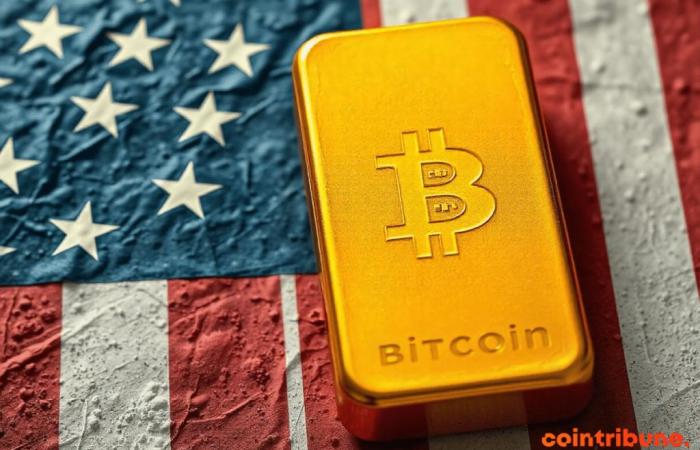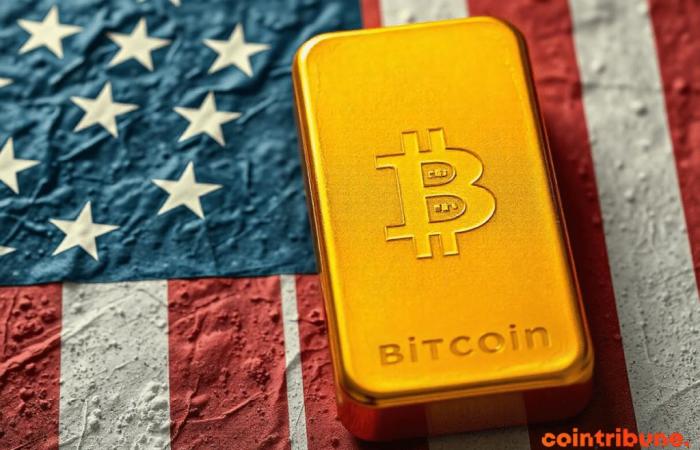12h00 ▪
9
min reading ▪ by
Nicolas T.
Gold could have a bad year if the US government actually sells some of its gold to create a strategic bitcoin reserve.
Gold continues to shine
Gold has not said its last word. It appreciated by 25% in 2024, compared to 23% for the S&P 500 and 120% for bitcoin. But wouldn’t this be a last stand?
Despite an exceptional year, gold continues to pale in comparison to bitcoin. This yawning gap applies to any period. The average annual return of bitcoin was 77% over the last five years, compared to 10% for gold and 15% for the American stock market.
The same if we take the accounts over the period of the last five years, with performances of 67%, 13% and 17% respectively.
All this being said, let us remember that the market capitalization of gold is almost nine times greater than that of bitcoin. This increase of 25% in 2024 is therefore remarkable, especially since bitcoin is gaining ground.
Is this the dead cat bounce, or are we on our way to $8,000 per ounce of gold? This is what the analyst predicts https://twitter.com/JanGold_/status/1880595494893916647 which points out three major risks:
“Increasing geopolitical tensions, over-indebtedness and inflation are shaking confidence [dans le dollar]. This results in a rotation from financial assets with counterparty risk (US Treasury Bills) to assets without counterparty risk (gold). »
Indeed, US Treasury bonds lost 8% last year. The standoff between the West and the BRICS is reflected in a growing disenchantment with American debt. And this, even though the FED rates are at their highest since the great crisis of 2007.
Rebellion against the imperial currency
Jan Nieuwenhuijs believes that the imperialist foreign policy of the United States pushes many central banks to keep gold in reserve rather than dollars (in the form of Treasury bonds):
“It is important to keep an eye on the share of gold in international foreign exchange reserves held by central banks. The share of gold in foreign exchange reserves fell from 95% in 1933 to less than 10% in 2015. But geopolitical tensions, the militarization of the dollar and growing concerns about the sustainability of the American public debt (122% of GDP) are pushing many countries towards gold. According to my estimates, the share of gold in total reserves reached 21% in the third quarter of 2024.”
Indeed, the “freezing” of 300 billion euros and dollars belonging to Russia has not gone unnoticed. Countries like Saudi Arabia have sharply increased their gold imports.
Others, like China, have been taking the lead for some time now. There is uncertainty surrounding China’s gold reserves, but one thing is certain, its dollar reserves have halved in the last decade.
Who still hoards gold?
The recent appreciation of gold is largely the result of many central banks shunning the dollar. They fear the wrath of the United States if their governments do not align with American foreign policy.
Overall, central bank gold purchases reached a record level in 2022 (the highest since 1950) and were almost as large in 2023 as in 2024.
India quintupled its purchases in 2024. Its central bank got its hands on 77 tonnes of gold during the first three quarters. The Turkish central bank is not left out with 72 tonnes, which brings its share to 34% of its foreign exchange reserves.
Next comes the Polish central bank with 69 tonnes. China, which has emerged as the largest buyer of gold in recent years, comes in fourth place with just under 30 tonnes.
The Czech Republic, Qatar, Iraq, Oman and the Republic of Kyrgyzstan follow. But also Kazakhstan, Hungary, Thailand, Japan, Brazil and even Singapore if we look at the last four years.
According to the “2024 Central Bank Gold Reserves Survey”, the majority (70%) of central banks expect new net purchases of gold (although moderate) in 2025. They also highlighted the role of precious metal as a strategic asset to reduce risks [de gel…].
What about bitcoin?
Probably many nations are considering making a place for bitcoin in their foreign exchange reserves. However, it is very difficult to risk it before the United States takes the initiative, which will surely be the case soon.
-This is why the governor of the Bank of France put water in his wine by declaring that everyone is free to buy Bitcoins. In Germany, former Finance Minister Lindner outlined two potential next steps for Germany and the EU:
-Resume the discussion on a strategic reserve of bitcoins
-Allow Bitcoin ETFs in the EU
MPs are also waking up in Italy. “If the United States were to create a strategic reserve of bitcoins, it would not be science fiction for other nations to do the same. That said, I do not believe that the conditions are right for this to happen in Italy in the space of a few months”said Italian MP Marcello Coppo.
In the United States, eleven states have introduced bills to create a bitcoin reserve:
Bitcoin does not appear on the first document published by the White House about the priorities of the new American government. Nevertheless, Michael Saylor met the entire government this Sunday. A good omen.
Donald Trump also purchased $47 million worth of bitcoins on January 20, the day of his inauguration. Not to mention that the majority of members of his government own bitcoins. There are signs that are unmistakable…
Swap gold for bitcoin?
That’s Sen. Cynthia Lummis’ plan. His bill (Bitcoin Act) provides for the creation of a strategic reserve of one million bitcoins.
The United States currently has 8,134 tons of gold. That’s the equivalent of $530 billion. Selling 1/5 of this gold would be enough to acquire a million bitcoins.
Why part with a store of value that has proven itself for 4,000 years? For many reasons:
1) Bitcoin is the only asset that exists in finite quantity. There will never be more than 21 million bitcoins and 94% are already in circulation. Conversely, the higher the price of gold, the more mining companies are encouraged to extract more land.
2) Bitcoin is a store of value as well as a payment network, two-in-one. The complete opposite of gold, whose transactions are very expensive, laborious and slow. Not to mention the conversion costs which vary between 10% and 30% in France!
The superiority of bitcoin is real. The supply of new BTC is already half that of its metal rival (compared to their respective existing stocks). It will be four times lower in 2028. Six times lower in 2032.
Gold is carried at arm’s length by central bankers. Private investors, for their part, have clearly chosen their side. This is what the comparison of Bitcoin ETFs to Gold ETFs reveals. The following graph is clear:
Exchanging gold for bitcoins would also allow the United States to weaken Russia and China, which have bought a lot of it over the last two decades. If Washington takes action, the whole world will follow suit, which is likely to cause gold to falter.
In this scenario, gold will not reach $8,000 anytime soon. On the contrary, the capitalization of bitcoin (~$2,000 billion) should catch up with that of gold (~$18,000 billion). On that day, a single bitcoin will be worth almost a million dollars.
Don’t miss our article: Bitcoin – Imminent tidal wave.
Maximize your Cointribune experience with our ‘Read to Earn’ program! For every article you read, earn points and access exclusive rewards. Sign up now and start earning benefits.
Nicolas T.
Reporting on Bitcoin, “the goddess of wisdom, feeding on the fire of truth, exponentially growing ever smarter, faster, and stronger behind a wall of encrypted energy”.







